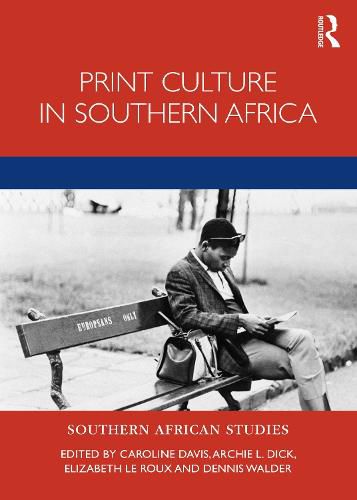Readings Newsletter
Become a Readings Member to make your shopping experience even easier.
Sign in or sign up for free!
You’re not far away from qualifying for FREE standard shipping within Australia
You’ve qualified for FREE standard shipping within Australia
The cart is loading…






Print Culture in Southern Africa is concerned with the institutions and processes informing textual production, circulation and consumption in the region, over a broad historical period from the late 18th century to the present day. The book is organised around three closely related themes. Firstly, it presents original research into the formation of reading publics and the impact of reading cultures, by uncovering obscure but important reading communities and circuits of book distribution and reception. A second theme is the relationship between print and politics, with a particular focus on the networks of power: how control over the production and circulation of printed books has shaped literary and cultural development. The third theme is transnational print culture, and how the control exercised by publishers in Europe and America has shaped literature and society in southern Africa.
Drawing together interdisciplinary research and diverse methodologies, the collection encompasses a range of perspectives, including literary studies, anthropology, publishing studies, the history of the book and art history, and many of the chapters are based on previously unexamined archives and collections. The volume contributes to current debates and opens up new and exciting ways of furthering the study of postcolonial literature and African book history.
The chapters included in this book were originally published in the Journal of Southern African Studies.
$9.00 standard shipping within Australia
FREE standard shipping within Australia for orders over $100.00
Express & International shipping calculated at checkout
Print Culture in Southern Africa is concerned with the institutions and processes informing textual production, circulation and consumption in the region, over a broad historical period from the late 18th century to the present day. The book is organised around three closely related themes. Firstly, it presents original research into the formation of reading publics and the impact of reading cultures, by uncovering obscure but important reading communities and circuits of book distribution and reception. A second theme is the relationship between print and politics, with a particular focus on the networks of power: how control over the production and circulation of printed books has shaped literary and cultural development. The third theme is transnational print culture, and how the control exercised by publishers in Europe and America has shaped literature and society in southern Africa.
Drawing together interdisciplinary research and diverse methodologies, the collection encompasses a range of perspectives, including literary studies, anthropology, publishing studies, the history of the book and art history, and many of the chapters are based on previously unexamined archives and collections. The volume contributes to current debates and opens up new and exciting ways of furthering the study of postcolonial literature and African book history.
The chapters included in this book were originally published in the Journal of Southern African Studies.